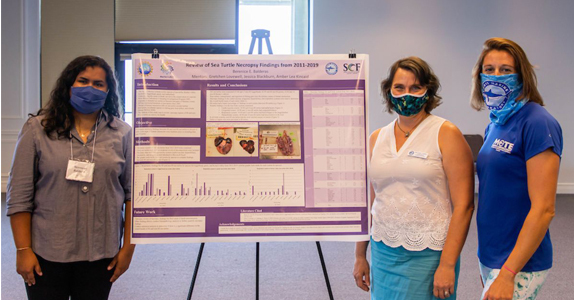
People & Business
Mote Addresses Need for Expanding Diversity
May 11, 2022 – Sarasota
As job opportunities in the field of marine science, technology, engineering and math (STEM) expand, questions regarding lack of diversity remain. Attracting and retaining high quality and diverse candidates in marine STEM careers may be increased through good mentorship. New peer-reviewed research from Mote Marine Laboratory & Aquarium researchers, BIPOC voices in ocean sciences: A qualitative exploration of factors impacting career retention, published in Journal of Geoscience Education, explores the recruitment and retention of Black, Indigenous or People of Color’s (BIPOC) careers in marine STEM fields based on their early career research mentorship experience.
Jasmin Graham, the Project Coordinator of the Marine Science Laboratory Alliance Center of Excellence (MarSci-LACE)* and first author on the paper, analyzed the exclusion of BIPOC in STEM. The paper explored the impact various factors such as BIPOC-focused programs, discrimination, allyship, mentorship and research experiences on senses of belonging, science identity and self-efficacy
among BIPOC marine scientists and aspiring marine scientists. Graham conducted interviews with 47 BIPOC participants, including some who left the marine science field due to a lack of support and perceived insurmountable barriers.
“This study illustrates the issues that have led to a lack of retention of BIPOC students and professionals in the field,” said Graham.
As a result, Graham and her co-authors from Mote identified that research and field experiences must be developed intentionally to recruit and retain BIPOC students in marine science. The publication calls attention to the future of marine STEM, and the research behind how discrimination can disrupt the relationship between a mentor and a colleague.
“With results from this exploration of the sometimes subtle issues, perceptions, and actions that can often unknowingly create challenges for BIPOC students and early career scientists to successfully pursue careers in marine STEM fields, we can facilitate improved opportunities for attracting, mentoring and retaining more diverse future generations of marine scientists,” said Dr. Michael P. Crosby, President & CEO of Mote and a co-author on the publication.
“What the study boils down to is the importance of a good mentor, and what that can do for a BIPOC student entering the field”, said Aly Busse, Mote Associate Vice President for Education, and a co-author on the publication. “Whether in the marine science field or outside of a research experience, a positive environment can make a difference.”
“I think something that is important for people to highlight is the fact that being a person of color and being Black, you have to deal with these issues at every single junction in your life, in every single compartment,” said one interviewee. “It’s not just one aspect that you have to deal with, it’s not just walking on the street, but every single point of my life I have to be thinking about this.”



You must be logged in to post a comment Login